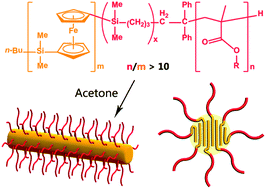In order to increase the range of coronal chemistries available for CDSA protocols a series of highly asymmetric diblock copolymers comprising a PFS block and a polymethacrylate coblock (poly(tert-butylmethacrylate) (PtBMA), poly(n-butylmethacrylate) (PnBMA), and poly(N,N-dimethylaminoethylmethacrylate) (PDMAEMA), were synthesized by sequential living anionic polymerization. Self-assembly of these block copolymers in acetone yielded cylindrical micelles with a crystalline PFS core and a polymethacrylate corona. The cylindrical micelles were fragmented by sonication and the short micelles were successfully used as “seed initiators” to grow longer monodisperse cylindrical micelles with controlled lengths from added unimers via crystallization-driven living self-assembly. Block co-micelles were also prepared by the sequential addition of unimers with a different coronal block to pre-existing cylinders. These nanostructures could be potentially used as scaffolds for the directed deposition of nanoparticles or for electrostatically-induced organization into hierarchically ordered nanomaterials.
Synthesis and crystallization-driven solution self-assembly of polyferrocenylsilane diblock copolymers with polymethacrylate corona-forming blocks by Nina McGrath, Felix H. Schacher, Huibin Qiu, Stephen Mann, Mitchell A. Winnik and Ian Manners Polym. Chem. 2014, 5, 1923-1929.
Julien Nicolas is a web-writer and advisory board member for Polymer Chemistry. He currently works at Univ. Paris-Sud (FR) as a CNRS researcher.











